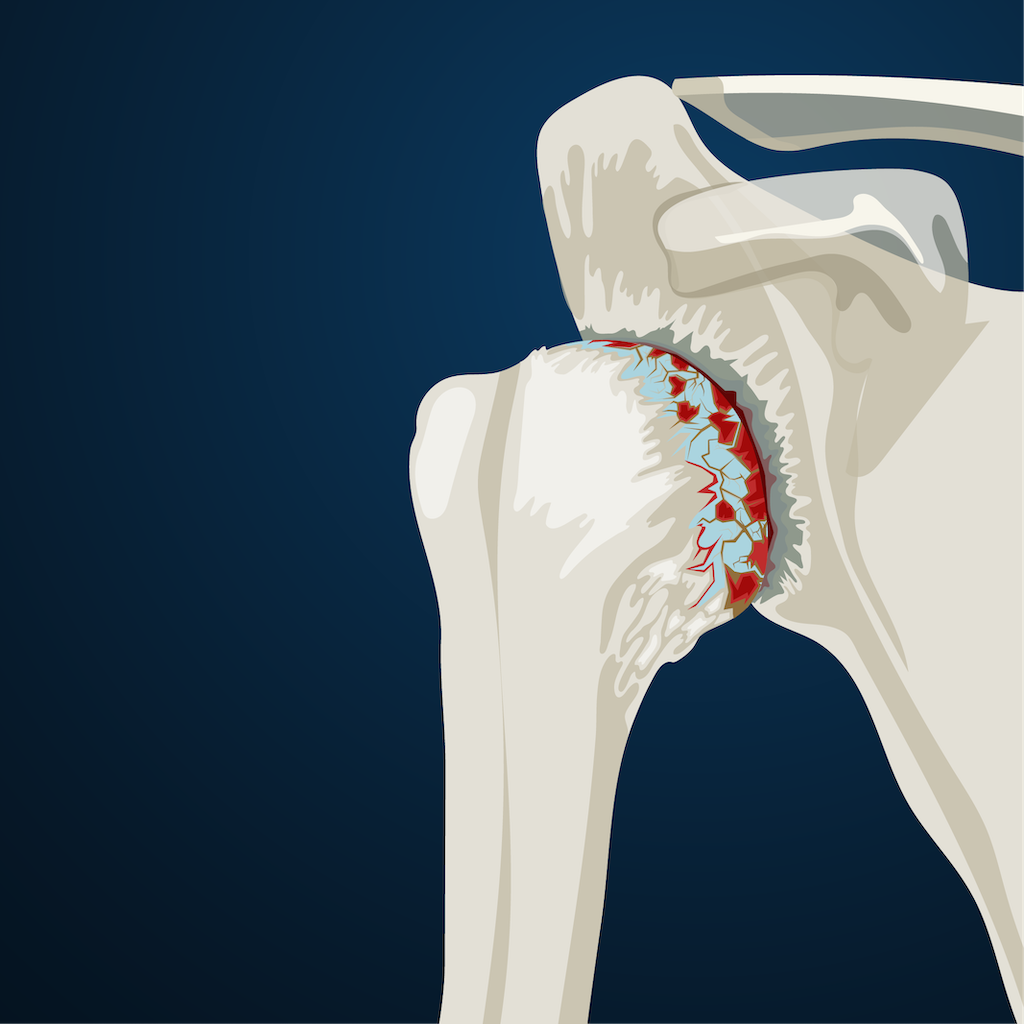
Shoulder Arthritis
Initially, it is usually warranted to try conservative treatments (non-surgical) for shoulder arthritis. This will include resting the shoulder or modifying activities that make the pain more severe.
The use of non-steroidal anti-inflammatory medications (arthritis meds) such as ibuprofen or naproxen can help with pain by reducing the inflammatory component of arthritis.
Physical therapy can also help by helping the patient improve range of motion and functional use of the shoulder. Additionally, using dietary supplements such as glucosamine and chondroitin have helped some patients’ symptoms.
The First Sign of Shoulder Arthritis
The first sign of shoulder arthritis is pain. Shoulder arthritis is a condition where the cartilage deteriorates and becomes rough as the cartilage begins to break up and wear down. The joint subsequently loses its smooth gliding and becomes painful with motion.
Articular cartilage is the material that covers the ends of the bones where they contact to become a joint. Articular cartilage is a very durable material that provides a smooth and impact-resistant surface and allows the bones to glide over one another during the joint range of motion.
Types of Arthritis That Lead to Joint Deterioration
Osteoarthritis (Degenerative Arthritis)
This is the most common type of arthritis and usually results from age-related degeneration of the cartilage. People affected with osteoarthritis are most commonly over 50 years of age. As we age, the structure of the cartilage changes, and it loses its ability to withstand the stress of joint forces.
This type of arthritis is progressive and usually worsens over time. As arthritis progresses, bone spurs develop and the joint becomes painful with a range of motion, lifting, and it can even progress to severe pain at rest. Night pain is also very common in arthritis of the shoulder.
Post Traumatic Arthritis
This condition is very similar to osteoarthritis, but the onset is secondary to a traumatic event that initiates damage to the cartilage surface. This event can be a traumatic shoulder dislocation, a severe fall onto the shoulder, or a fracture. Patients affected by post-traumatic arthritis are typically much younger.
Inflammatory Arthritis
This type of arthritis is secondary to autoimmune disorders where their own immune systems attack and destroy the cartilage. Common forms of this disease include Rheumatoid Arthritis, Systemic Lupus Erythematosis, or Seronegative Arthritis. These patients can be of any age but are typically younger.
Symptoms of Shoulder Arthritis
Shoulder arthritis typically presents with a gradual onset of pain, initially as a minor ache or soreness that worsens with activity or vigorous shoulder use. This pain often becomes more pronounced at night, frequently disrupting sleep and contributing to overall discomfort. As the condition progresses, the pain intensifies, becoming more persistent and severe, eventually impacting daily activities and limiting the shoulder’s functionality.
In advanced stages of shoulder arthritis, the pain is accompanied by a significant loss of range of motion. Patients may experience stiffness, making it difficult to perform routine tasks that involve lifting or reaching. As arthritis reaches its “end-stage,” mechanical symptoms such as catching, grinding, or a grating sensation within the shoulder joint become more noticeable. These symptoms reflect the deterioration of joint surfaces and cartilage, which can severely impact the quality of life.
Diagnosis
In order to diagnose arthritis, I will obtain a detailed history of your problem and perform a physical exam. With the exam, I will assess your active range of motion, passive range of motion, and strength. I will also feel or palpate the joint for areas of tenderness or crepitation (grinding) of the joint with motion.
Next, diagnostic studies are necessary to look at the shoulder. X-rays will usually make the diagnosis, but often more advanced imaging such as an MRI or a CAT scan is needed to fully define the problem.
Non-Operative Treatment
Initially, it is usually warranted to try conservative treatments (non-surgical) for shoulder arthritis. This will include resting the shoulder or modifying activities that make the pain more severe.
The use of non-steroidal anti-inflammatory medications (arthritis meds) such as ibuprofen or naproxen can help with pain by reducing the inflammatory component of arthritis.
Physical therapy can also help by helping the patient improve range of motion and functional use of the shoulder. Additionally, using dietary supplements such as glucosamine and chondroitin have helped some patients’ symptoms.
Surgery for Shoulder Arthritis
When conservative measures fail or if damage to the bone is very severe, operative treatment is indicated when symptoms are severe. The recommended treatment will depend on multiple factors including the severity of arthritis and the patient’s age.
When patients are young (<50 years) or when the arthritis is not terribly advanced, arthroscopy may have a role in treatment. Arthroscopy is where the surgeon will place a camera in the joint and inspect it for damage. Utilizing specialized instruments, the rough cartilage surfaces can be smoothed out, bone spurs can be removed, and scar tissue can be removed in order to improve range of motion and alleviate the pain associated with arthritis.
In more advanced cases, shoulder joint replacement can be performed. During this procedure, the surfaces of the joint are replaced with a metal and plastic joint that provides a smooth surface for movement. Patients can expect to have near-complete relief of pain and improved range of motion and function after a shoulder replacement.
Where there are approximately 750,000 hip and knee replacements performed in the United States each year, there are only approximately 25,000 shoulder replacements performed annually. Shoulder replacement is a technically demanding procedure and should be performed by a surgeon with extensive experience. Dr. Jones has a special interest in this procedure and has performed hundreds of shoulder replacements with very good results.
If you are experiencing the symptoms of shoulder arthritis and would like to be evaluated, please contact Dr. Jones’ office for an evaluation.
